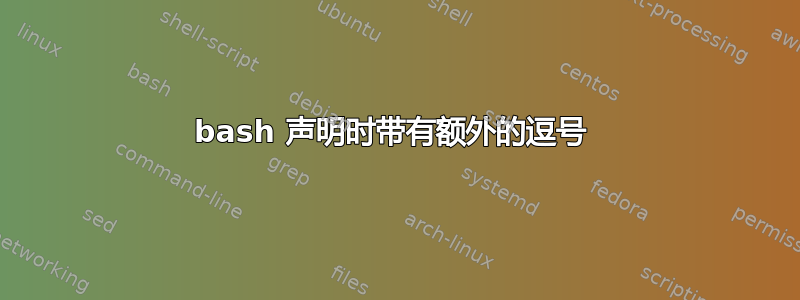
declare -r is_debug true
if [ "$is_debug" = true ]; then
printf "%s\n", "is debug"
else
printf "%s\n", "is not debug"
fi
declare -p is_debug
echo "${is_debug-isunset}"
输出:
jian@jian:~/Desktop/pg_src/src4/postgres$ bash /home/jian/scratch/scratchpads/47a6066b9dfaca1c2b13ea2e99f4e929/scratch.sh
is not debug
,declare -r is_debug
isunset
jian@jian:~/Desktop/pg_src/src4/postgres$ bash --version
GNU bash, version 5.1.16(1)-release (x86_64-pc-linux-gnu)
Copyright (C) 2020 Free Software Foundation, Inc.
License GPLv3+: GNU GPL version 3 or later <http://gnu.org/licenses/gpl.html>
This is free software; you are free to change and redistribute it.
There is NO WARRANTY, to the extent permitted by law.
declare -p is_debug
echo "${is_debug-isunset}"
我对输出感到困惑,declare -r is_debug。我希望它能回来declare -r is_debug。
答案1
declare -r is_debug true
声明两个只读变量is_debug并且true不设置它们的值。除非在函数内调用,否则它们将保留其原始值(如果有)。如果在函数内调用,将实例化一个没有值的新局部变量(除非该变量已在该范围内使用local//预先声明)。typesetdeclare
您可能想要:
declare -r is_debug=true
或者更可移植(如果在函数内调用,则不使变量成为本地变量):
readonly is_debug=true
printf "%s\n", "is debug"
与...一样:
printf '%s\n,' "is debug"
或者
printf 'is debug\n,'
打印is debug后跟一个换行符,后跟一个逗号,该逗号后面没有换行符,因此输出的下一个内容将附加到该逗号后。
您可能想要:
printf '%s\n' 'is debug'
或者:
printf 'is debug\n'
或者:
echo 'is debug'
(它自己添加换行符)
或者:
echo is debug
asecho碰巧在打印参数之前用一个空格将其连接起来。
尽管printf通常比echo,在这种情况下使用没有问题,echo因为我们知道第一个参数不以 开头-,所有参数都包含纯 ASCII 字符并且没有反斜杠。
逗号用于在 csh 风格的大括号扩展中分隔事物:
$ echo {a,b}c
ab ac
在这里,除了 zsh 之外,您可以(而不是应该)编写它:
$ {echo,is,debug}
is debug
以及 Korn 风格的算术表达式(类似 C 的语法)
$ echo "$(( (a = 6), (b = 7), a * b ))"
42
(并非所有 shell 都支持,算术表达式,请注意,在 ksh93 中,它可能与,语言环境中的浮点基数字符冲突,其中它是逗号而不是点)。
但不用于分隔命令的参数。命令的参数由空格分隔(对于 bash,这些字符在语言环境中被归类为空白,并在一个字节上进行编码,其中包括空格、制表符,有时还包括不间断空格字符)。
也许,您对这种类似 C 语言printf的功能感到困惑。awk在 中awk,你可以写:
BEGIN{printf "%s %d\n", "string", number}
就像在 C 语言中一样,你可以这样写:
printf("%s %d\n", "string", number);
(括号也可用于awk)。
但 shell 语言的语法与大多数其他语言(尤其是 C/awk)的语法有很大不同。
在 shell 中,引号不是用来引入字符串常量(shell 中一切都是字符串),而是用来删除某些字符在语言中具有的特殊含义。
例如,在:
printf '%s\n' 'is debug'
引号(此处使用单引号,因为"..."更好地保留用于包含扩展的内容)用于将其对 shell 的特殊含义删除为反斜杠字符(这也是 shell 语法中的引用运算符)和空格字符,如我们所见,用于分隔命令的参数。
我们还可以引用除需要保留其特殊含义的字符之外的所有内容:
'printf' '%s\n' 'is debug'
或者:
\p\r\i\n\t\f \%\s\\\n \i\s\ \d\e\b\u\g
除了分隔这 3 个参数的两个空格之外的所有字符都被引用。
或者只引用那些需要失去特殊含义的内容:
printf %s'\'n is' 'debug
或者:
printf %s\\n is\ debug
这就是所有 shell 语法,最终都会执行完全相同的操作:printf使用printf,%s\n和is debug作为三个单独的参数运行命令。
我希望它能澄清为什么将逗号移入或移出引号完全没有区别,该逗号在 shell 语法中没有特殊含义,因为它不用作大括号扩展的一部分或在算术表达式中使用。
有关各种 shell 中特殊字符和引用运算符的更多详细信息,请参阅:如何在 Unix shell 中像普通字符一样使用特殊字符?


